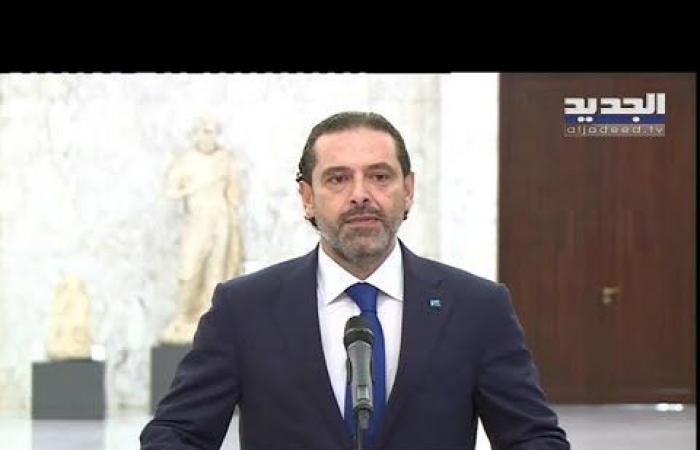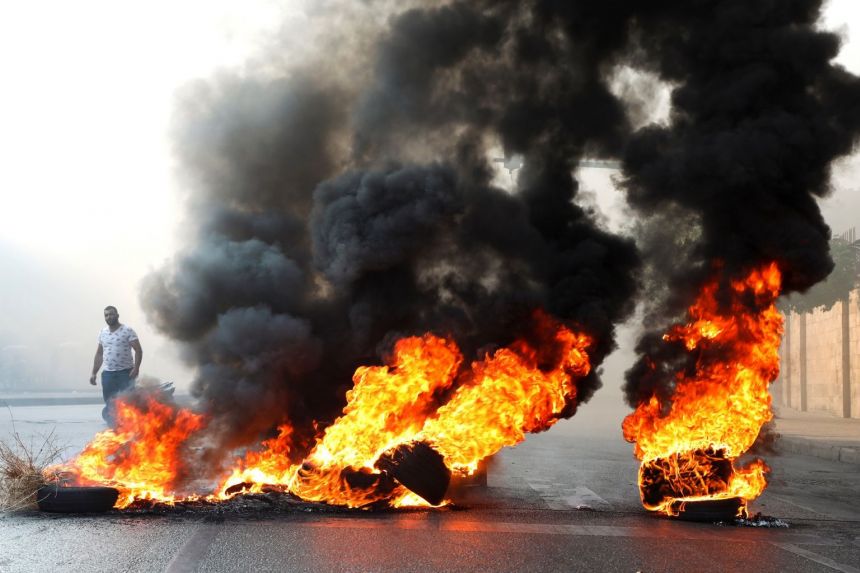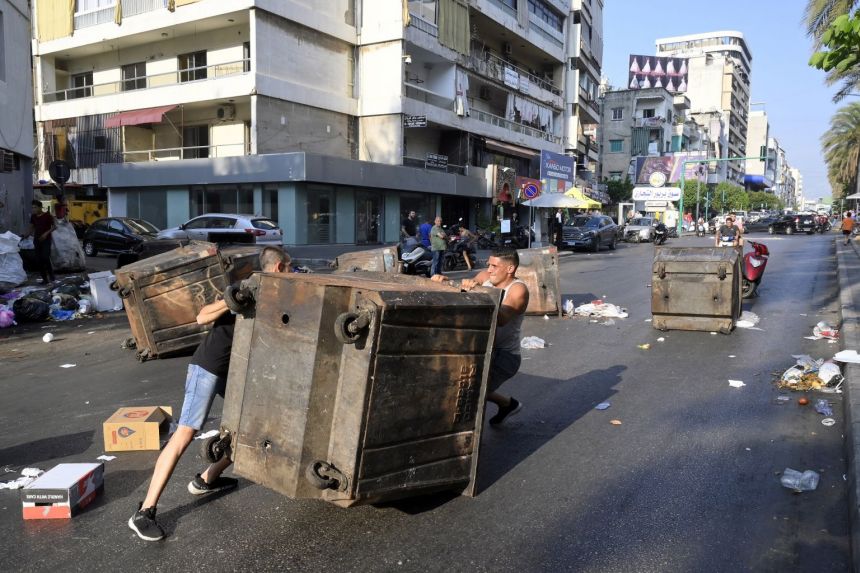By Shawna Chen

Lebanon’s Prime Minister-designate Saad Hariri stepped down Thursday amid months of deadlock and years-long turmoil over the country’s economic collapse.

Driving the news: His departure sinks the chances of forming a government to pursue immediate reforms for recovery, per AP, and is likely to bring greater instability to Lebanon.
- Supporters of Hariri, one of Lebanon’s most prominent Sunni Muslim leaders, and other protesters blocked roads and set fire to tires in parts of Beirut following the news.
- Troops fired rubber-coated steel bullets and used armored vehicles to force open roads to disperse protests, while demonstrators threw stones at soldiers, Al Jazeera reports.
- There is no clear candidate to replace Hariri, who cited “key differences” with the president.

Catch up quick: Lebanon has not had a working government since Prime Minister Hassan Diab’s Cabinet resigned days after a deadly explosion last August. Protesters blamed the disaster, which killed more than 211 people, injured 6,000 and left roughly 300,000 homeless, on the ruling elite’s corruption.
What they’re saying: “I have excused myself from forming the government,” Hariri said after a 20-minute meeting with President Michel Aoun, according to AP. “May God help the country.”
- Under the country’s sectarian-based political system, the prime minister comes from the Sunni community.
- Hariri told Al-Jadeed TV that he doesn’t plan to endorse a replacement.
- Aoun has said he will consult with parliamentary blocs.
Hariri’s resignation is “yet another disappointing development for the Lebanese people,” U.S. Secretary of State Antony Blinken said in a statement.
- “The Lebanese economy is in free-fall, and the current government is not providing basic services in a reliable fashion,” he added. “It is critical that a government committed and able to implement priority reforms be formed now.”
Worth noting: The national currency dropped to a new low on Thursday. The Lebanese pound, which has been pegged to the dollar for 30 years, at a rate of about 1500 to the dollar hit 22,000 after Hariri quit. The currency has lost more than lost more than 95% of its value, AP reports.
The big picture: Lebanon has undergone one of the world’s worst economic collapses in history since 2019.
- Children have borne the brunt of the chaos, with over 30% going to bed hungry and skipping meals in the past month.
Lebanon crisis: Political crisis escalates
after Hariri quit gov. formation mission
By Shawna Chen
Lebanon’s Prime Minister-designate Saad Hariri stepped down Thursday amid months of deadlock and years-long turmoil over the country’s economic collapse.
Driving the news: His departure sinks the chances of forming a government to pursue immediate reforms for recovery, per AP, and is likely to bring greater instability to Lebanon.
- Supporters of Hariri, one of Lebanon’s most prominent Sunni Muslim leaders, and other protesters blocked roads and set fire to tires in parts of Beirut following the news.
- Troops fired rubber-coated steel bullets and used armored vehicles to force open roads to disperse protests, while demonstrators threw stones at soldiers, Al Jazeera reports.
- There is no clear candidate to replace Hariri, who cited “key differences” with the president.
Protesters confront Lebanese soldiers during a demonstration in Beirut. Photo: Marwan Naamani/Picture alliance via Getty Images
Catch up quick: Lebanon has not had a working government since Prime Minister Hassan Diab’s Cabinet resigned days after a deadly explosion last August. Protesters blamed the disaster, which killed more than 211 people, injured 6,000 and left roughly 300,000 homeless, on the ruling elite’s corruption.
What they’re saying: “I have excused myself from forming the government,” Hariri said after a 20-minute meeting with President Michel Aoun, according to AP. “May God help the country.”
- Under the country’s sectarian-based political system, the prime minister comes from the Sunni community.
- Hariri told Al-Jadeed TV that he doesn’t plan to endorse a replacement.
- Aoun has said he will consult with parliamentary blocs.
Hariri’s resignation is “yet another disappointing development for the Lebanese people,” U.S. Secretary of State Antony Blinken said in a statement.
- “The Lebanese economy is in free-fall, and the current government is not providing basic services in a reliable fashion,” he added. “It is critical that a government committed and able to implement priority reforms be formed now.”
Worth noting: The national currency dropped to a new low on Thursday. The Lebanese pound, which has been pegged to the dollar for 30 years, at a rate of about 1500 to the dollar hit 22,000 after Hariri quit. The currency has lost more than lost more than 95% of its value, AP reports.
The big picture: Lebanon has undergone one of the world’s worst economic collapses in history since 2019.
- Children have borne the brunt of the chaos, with over 30% going to bed hungry and skipping meals in the past month.
- AXIOS

Leave a Reply
You must be logged in to post a comment.